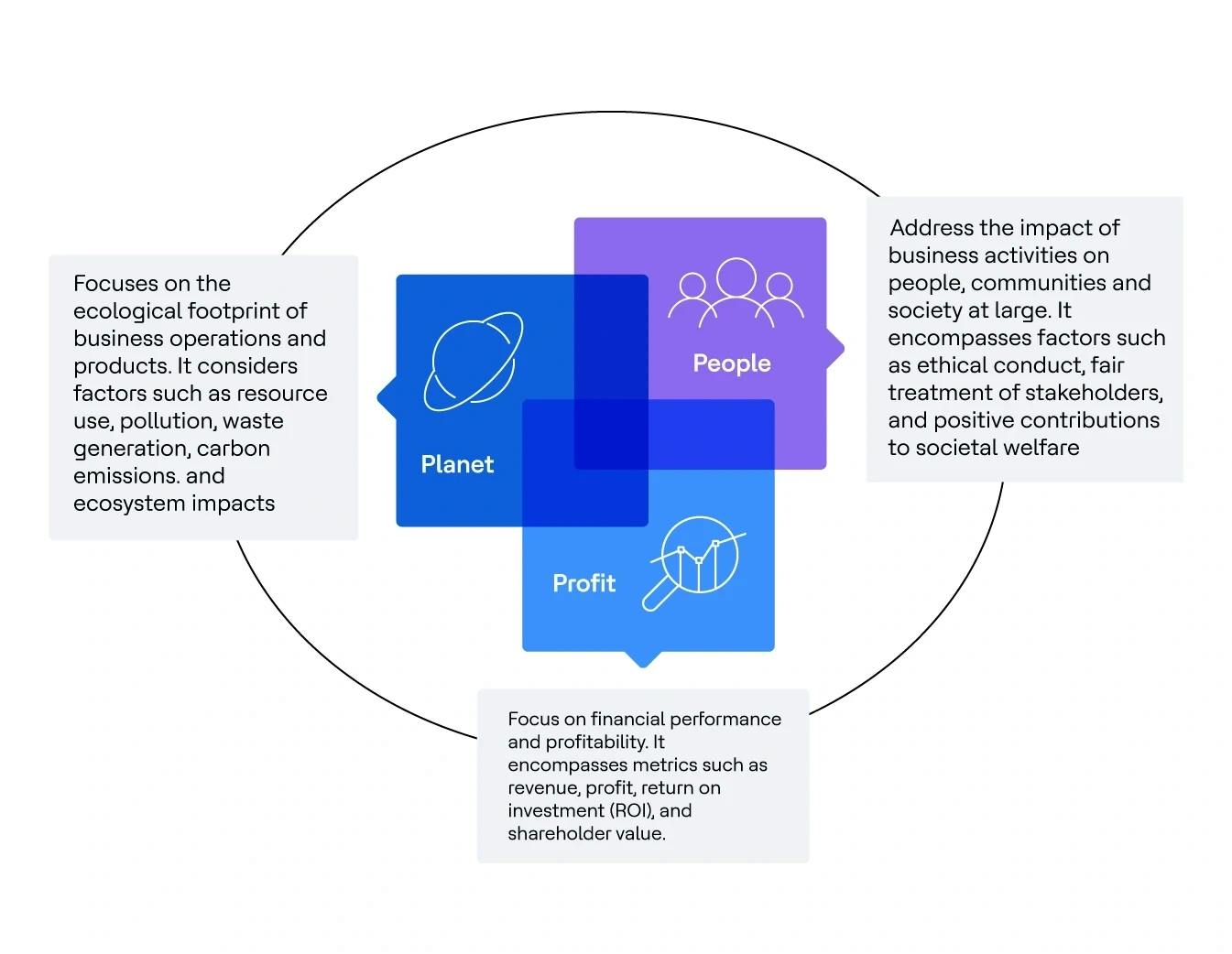In the modern era, characterized by rapid technological advancements and abundant opportunities, we find ourselves in the dilemma of preserving resources for future generations while being enticed by the promise of development. Sustainability reminds us of our responsibility to safeguard these resources and restore what we have exploited.
At its core, sustainability refers to continuously maintaining or supporting a process over time. In business contexts, it seeks to prevent the depletion of natural or physical resources, ensuring their long-term availability. Traditionally seen as a cost center, sustainability has introduced a groundbreaking approach emphasizing profitability. It entails adopting practices and initiatives that address environmental and social concerns while contributing to financial returns.
Research indicates that corporations incorporating climate change considerations into their planning enjoy returns up to 18% on investment, signaling the economic benefits of sustainable practices.
In recent years, profitable sustainability has emerged as a powerful force reshaping the business landscape. No longer seen as merely a moral imperative or a trend followed by a handful of eco-conscious companies, sustainability has become a strategic business approach that yields tangible economic benefits while addressing pressing environmental and social challenges.
Understanding profitable sustainability
Profitable sustainability, at its core, refers to integrating environmental, social and governance (ESG) considerations into business strategies to create long-term economic value. It goes beyond traditional CSR initiatives by recognizing that sustainability can drive innovation, efficiency and resilience, ultimately leading to competitive advantage and enhanced financial performance.
Businesses embracing profitable sustainability adopt a triple-bottom-line approach, considering financial returns and social and environmental impacts. This entails reducing carbon emissions, minimizing waste, promoting diversity and inclusion, ensuring ethical supply chain practices and fostering community engagement, among other initiatives. By aligning business objectives with broader societal and environmental goals, companies can create shared value for stakeholders while mitigating risks and securing their license to operate in an increasingly conscious marketplace.

The growing importance of profitable sustainability
In defiance of conventional wisdom that views sustainability initiatives as profit drains, both consumers and organizations are spearheading a paradigm shift. They now perceive sustainability endeavors as strategic investments rather than burdensome expenses. Through meticulous research and assessment, it becomes evident that these initiatives yield long-term returns and bolster overall profitability. This nuanced understanding underscores a pivotal transition towards recognizing sustainability as a cornerstone of strategic business planning.
Several factors are driving the growing importance of profitable sustainability:
- Consumer demand: Customers today, especially global organizations, are increasingly prioritizing sustainable products, to enhance brand reputation and reduce Scope 3 emissions.
- Investor interests: Investors recognize the financial prudence of integrating environmental, social and governance (ESG) factors into investment decisions, leading to a surge in green financing for sustainable projects.
- Purpose-driven profits: Aligning financial goals with sustainability fosters resilience, innovation and long-term success, embodying conscious capitalism principles where businesses thrive by balancing profit with purpose.
- Ethical edge: Companies are gaining a competitive edge by demonstrating their commitment to ethical practices, attracting discerning consumers who want to support brands that align with their values.
- Leadership-driven initiative: Forward-thinking CEOs and executives recognize the business case for sustainability and are championing its integration into corporate strategy. They foster a culture of innovation and responsible stewardship by aligning sustainability goals with business objectives.
- Regulatory pressures: Governments worldwide are implementing stricter environmental regulations and standards, such as compliance with CSRD, GRI standards, The New California Law and many others, compelling businesses to adopt more sustainable practices or face penalties. Additionally, initiatives such as the Paris Agreement and the United Nations Sustainable Development Goals (SDGs) provide a framework for corporate action on sustainability.
Consumers are willing to pay a premium for environmentally friendly products, giving businesses a competitive edge. Embracing sustainability is no longer just a moral imperative but a strategic business decision that can drive growth and profitability while simultaneously contributing to a healthier planet.
Corporate challenges and solutions for maintaining and implementing profitable sustainability:
Transitioning to sustainable practices offers numerous benefits, but businesses often need help maintaining profitability during implementation. Some common hurdles include initial investment costs, sourcing sustainable suppliers and securing buy-in from stakeholders. However, strategic solutions can overcome these obstacles and ensure long-term profitability:
Initial investment costs:
Challenge: Upfront costs for transitioning to sustainable practices can strain budgets, impacting short-term profitability.
Solution: Develop a sustainability roadmap with phased implementation, prioritizing initiatives with high ROI and quick payback periods. Seek funding options like green financing or grants to offset initial expenses.
Finding sustainable suppliers:
Challenge: Identifying reliable and cost-effective sustainable suppliers can be challenging, especially for niche or specialized products.
Solution: Build strong partnerships with suppliers committed to sustainability. Conduct thorough supplier audits and certifications to ensure alignment with your sustainability goals.
Ensuring stakeholder buy-in:
Challenge: Gaining support from employees, investors, customers and other stakeholders for sustainability initiatives can take time, especially if there's skepticism or resistance.
Solution: Communicate the business case for sustainability clearly, emphasizing the long-term benefits for all stakeholders. Engage employees through training programs and incentives, involve investors in discussions about sustainability's financial returns and listen to customer feedback to tailor sustainability efforts to their preferences.
Technology adoption and efficiency:
Challenge: Integrating new technologies to improve sustainability can be daunting. It requires investment, training and potentially disrupts existing processes.
Solution: Embrace technology solutions such as data analytics, IoT devices and automation to optimize resource usage, reduce waste and enhance efficiency. Invest in employee training to ensure smooth adoption and leverage technology vendors' expertise for implementation support.
Collaboration and knowledge sharing:
Challenge: Businesses may need help keeping pace with evolving sustainability best practices and regulations, which can lead to inefficiencies and missed opportunities.
Solution: Participate in industry associations, forums and collaborative initiatives to share knowledge, experiences and resources with peers. Collaborate on pre-competitive projects and standards development to drive collective progress towards sustainability goals.
By strategically addressing these challenges, businesses can achieve profitable sustainability in the long run, reaping the benefits of reduced costs, enhanced brand reputation, and resilience to future environmental and social challenges. Next, we'll delve into specific strategies and case studies to illustrate successful approaches to overcoming these obstacles. Stay tuned for more insights.
Conclusion:
In conclusion, profitable sustainability marks a significant change in how businesses approach sustainable development. By aligning economic interests with environmental and social imperatives, companies can create value for stakeholders while contributing to a more sustainable and inclusive future. As the business case for sustainability continues to strengthen, organizations that embrace this mindset will thrive in the marketplace and leave a positive legacy for generations to come.
For more information, please write to us at HCBU-PMG@hcltech.com.



